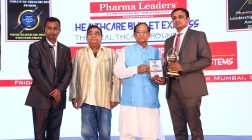Pharma & Healthcare Loses Focus in PC’S Budget!!!
Budget could have delivered more for healthcare, pharma sectors
Healthcare and pharmaceutical industries today welcomed steps announced in the Budget to increase allotment on health and medical education.
at “health for all” remained a priority for the United Progressive Alliance Government, Finance Minister P. Chidambaram allocated Rs 37,330 crore to the Ministry of Health and Family Welfare.
This is a substantial increase from the current financial year’s revised estimate of Rs 29,272.56 crore. The last Budget allocated Rs 34,488 crore to the Ministry.
The new National Health Mission, which combines the National Rural Health Mission and the proposed National Urban Mission, will get Rs 21,239 crore, the Minister said in his speech. This is an increase of Rs 24.3 per cent over the current fiscal’s revised estimate.
The Finance Minister also provided Rs 4,727 crore for medical education, training and research. He allocated Rs 150 crore to the National Programme for the Health Care of Elderly, which is being implemented in 100 districts of 21 States. “Eight regional geriatric centres are being funded for the development of dedicated geriatric departments,” he said.
Chidambaram said Ayurveda, Unani, Siddha and Homoeopathy were being mainstreamed through the National Health Mission and proposed to allocate Rs 1,069 crore to the Department of AYUSH.
The six AIIMS-like institutions, which admitted their first batch of students in September 2012, will get Rs 1,650 crore in the coming financial year. “The hospitals attached to the colleges will be functional in 2013-14,” he added.
Industry circles responded to the increased allocation to the health sector cautiously.
Hitesh Sharma, Partner and National Leader, Life Sciences, Ernst & Young, said there was nothing much for the pharmaceuticals or healthcare sector.
“Directionally, the Government has shown the commitment towards the health care sector by increasing the spend for National Health Mission by 24 per cent over revised estimate of last year. Also, the continued focus on medical education and training (including through AIIMs) is positive,” he added.
Chidambaram said the increase in surcharge from five to 10 per cent and increase in royalty rates from 10 to 25 per cent (subject to double tax treaty relief) would impact the pharma sector negatively.
“Most demands of the sector like tax holiday period increase for healthcare, GST roll out, service tax exemption for clinical trials activity, etc have not been addressed in the Budget,” he added.Healthcare and pharmaceutical industries today welcomed steps announced in the Budget to increase allotment on health and medical education.
However, private players expressed concern that Finance Minister P Chidambaram could have provided support in the form of tax incentives as well.
Commenting on the Budget, Apollo Hospitals Group Chairman Prathap C Reddy told PTI, “We are happy about increase in allotment of funds for healthcare and medical education, training and research.”
In the Budget 2013-14, Rs 37,330 crore has been allocated to the Ministry of Health and Family Welfare. Of this, the new National Health Mission that combines the rural mission and the proposed urban mission will get Rs 21,239 crore, an increase of 24.3% over the revised estimate.
Moreover, another Rs 4,727 crore has been provided towards medical education, training and research.
Organisation of Pharmaceutical Producers of India (OPPI) President and CMD Novartis India Ranjit Shahani said the increased allocation for the health mission is a welcome step.
He, however, added: “We were hoping the Budget would breathe some life into the economy. The expectations of a big bang announcement to restart the economy were belied � expectations were high…”
Welcoming the overall steps taken in the Budget, Jubilant Life Sciences Co-chairman & MD Hari S Bhartia said: “A number of initiatives specially on infrastructure including investment allowance, increased focus on social sector, education, skills , financial sector, agriculture, rural economy would fuel growth.”
Yet, the industry players felt there could have been more sector specific incentives.
“As private healthcare providers, we were expecting support for building capacity in the sector as there is a huge shortage of beds and education with increasing challenges from the non communicable diseases (NCDs). There is also the need for tax incentives for the healthcare industry,” Reddy said.
Expressing similar sentiments, Fortis Healthcare Executive Vice-Chairman Shivinder Mohan Singh said: “I think keeping in mind this fiscal deficit there is nothing much that you could have expected, and really healthcare is getting short shift for a while and I think its going to continue for a while.”
Similarly, SRL Diagnostics Managing Director Sanjeev K Chaudhry felt that private sector which serves 75% of the healthcare diagnostics responsibility for the country has not been given its due in the Budget.
“The long standing industry demands for providing fiscal relief for consumables and tax incentives for accreditation have yet been given a miss,” Chaudhry said.
Union Budget turns out to be a disappointment for healthcare and pharmaceutical industry. Most of them believe a rise in the healthcare sector spending gets offsets by rising inflation.
Vadodara-based BAPS Hospital’s chief executive officer, Neeraj Lal, points out the increase in the healthcare allocation by 22% would get offset by spiraling inflation. “Where is the actual increase in healthcare spending?” asks Mr Lal.
Finance Minister P Chidambaram earmarked Rs 37,330 crore for the sector in the next financial year 2013-14 budget, up from Rs 30,702 crore in the current fiscal, thus a rise of 22% in allocation.
As per RBI data, Wholesale-price inflation decelerated to 7.18% in December from 7.24% in the preceding month, while retail inflation increased to 10.56% in December from 9.9% a month earlier. Even a recent proposed freight hike in the Railway budget by 5.7% for hauling coal could have an adverse effect on the electricity bills – which like diesel and LPG may go up marginally thus further adding to the inflation.
According to Mr Neeraj Lal, this budget is disappointing as it does not provided any sop or incentives for medical implants and medi-technology companies for setting up joint venture or technical collaboration for producing hi-tech equipments or implants locally. “Foreign made equipments or implants are nearly 50% costlier, thus inflates the healthcare cost” he adds.
“This budget does not have any substantial growth impetus for healthcare sector” observes Jayesh Shah, Chief financial officer, Intas Pharmaceuticals. “It’s a hopeless budget for healthcare sector” says J R Vyas, managing director, Dishman PharmaceuticalsBSE -0.93 % adding that at least government should have given a special subsidized medicine programme for the poor.
Even diagnostic companies are unmoved by these budget. “Considering the fact that private sector serves 75% of the healthcare diagnosticsBSE 0.96 % responsibility for the country, the Union Budget has yet again missed the opportunity to recognize the role of the private sector” said Dr. Sanjeev Chaudhry, managing director, SRL Diagnostics. According to Mr Chaudhry, the long standing healthcare diagnostic industry demands for providing fiscal relief for consumables and tax incentives for accreditation have yet been given amiss.
“Disappointing budget for healthcare” that all Chirag Doshi, chairman of Indian Drug Manufacturers Association (IDMA) Gujarat’s chapter had to say. He pointed out that the rise in healthcare allocation is been offsets by inflation.
“We have expected reduction in excise duty” says Mr Doshi, adding that this would have really helped to bring down the drug prices. He also added that if abatement which is right now 35% on drug MRP (maximum retail price), would have increased to 50% in this budget, then it could have allowed further drop in the medicine prices.
Hitest Sharma, partner & national leader, Ernst & Young (E&Y), says “Not much for the pharma or the healthcare sector in the budget.” He further says that the increase in surcharge from 5 to 10% and increase in royalty rates of tax from 10 to 25% (subject to double tax treaty relief) will impact the pharma sector negatively.
According to E&Y, the excise duty on MRP basis (with abatement of 35%) for ayurvedic, unani, bio chemicBSE -4.89 %, Siddha and Homeopath medicines, aligns these areas with the present regime for the pharma sector. Most demands of the sector like tax holiday period increase for healthcare, GST roll out, service tax exemption for clinical trials activity, etc have not been addressed in the budget.NEW DELHI: Topping the pre-budget wish-list of the Organisation of Pharmaceutical Producers of India (OPPI) submitted to the government regarding direct taxes is a request to stop the one and only regulation ever brought in by the government to curb the illegal practice of the pharmaceutical companies bribing health practitioners.
OPPI’s keenness to avoid any legislation curbing the industry’s marketing practices is evident from the plea that the taxation of all the money that pharma spends onfreebies that include gifts, money, travel facility and hospitality for doctors be linked to the “Uniform Code of Pharmaceutical Marketing Practices for Indian Pharmaceutical Industry” which is merely a self regulatory code.While doctors are penalised for taking bribes from pharmaceutical and healthcare industries, there is no law to stop the industry’s illegal practice of bribing health practitioners. The uniform code suggested by the industry does not have the power of a law and it is supposed to be self regulatory, i.e. enforced by the industry itself. Moreover the only sanction against a company found violating the code is an undertaking in writing that they would stop the practice that breaches the code and to publicise the decision.
The first time that the government brought in any kind of regulation on bribing practices of the industry was through a circular issued by the Central Board of Direct Taxes (CBDT) on August 1, 2012. The circular put an end to the tax exemption the industry used to get on money spent for “business promotion” which is what all the money spent on freebies for doctors was called. Barely six months after the circular was issued, the industry is asking for the circular to be kept in abeyance and for it to be linked to a toothless “self-regulatory” code.
Since the amended guidelines of MCI of 2009 made such freebies and promotional activities illegal, this provision of tax exemption was no longer applicable in the pharmaceuticals and allied health care industry, said the CBDT release. The CBDT circular was issued following a directive from the prime minister’s office after a meeting in July 2012 of the PMO and the department of pharmaceuticals with representatives of the drug industry, the MCI and finance ministry to respond to allegations of violations of the guidelines by doctors.
The MCI, doctors across the country and even the parliament standing committee on health have pointed out the inadequacy and unfairness of targeting only the doctors for regulation and penalising them while the industry which indulged in the practice went scot free. Union Budget had failed to elicit positive response from the industralists. According to them, the budget is a routine one and has nothing to offer for more growth and employment opportunities. Team TOI spoke to many industralists on the issue. The city houses some 6,800 industries.
Atul Seth, owner of a pharmaceutical company and general secretary of provincial industries association termed the budget to be a routine one. “It is strange that the finance minister did not speak about micro medium and small-scale Industries in his speech, especially when MSME units across the country contribute nearly 39% to the GDP. MSMEs have got nothing in the budget,” he said. He added that if the MSMEs will not grow in the country, the opportunities of creation of new jobs will end. This will increase unemployment.
The Indian Industries Association (IIA) had not welcomed the Union budget. Sunil Vaish, state vice-president of IIA, said that the industry owners are disappointed with the budget. “Our expectations have crashed. The sector which generates employment and engages in holding huge exports, had been ignored,” Vaish rued. He said that the tax slab for MSMEs was to be reduced but nothing had been done. He also raised the issue of severe power crisis in the country by saying that the industries require power and nothing had been done in this regard.
Yogesh Agarwal, owner of steel unit, said: “It is not a good budget. It is more of votebank politics than relaxation to industries.” The taxes and the excise duty should have gone down but this did not happen. The levying of 10% surcharge on an annual income of Rs 10 crore for the industrial units is wrong, he added. Inflation would rise. With an increase in the diesel price, the freight is bound to increase. This will further hike the price of the iron and steel goods, meant for the construction of houses. The dream of owing a house will get shaken, Agarwal added.
Micky Manchanda, president of UP Small-Scale Soap Industries Association termed the budget as worthless. “Inflation has affected one and all, be it rich or poor. Nothing has been done to address inflation. The soap industry is also going through a rough patch as the cost of the inputs had gone high,” he said. He added that inflation had hiked the prices of soaps to such an extent that everybody cannot afford to buy high-end bathing soaps/
The textile industry has welcomed the decision to remove import duty, imposed two years back. “We welcome the budget as it has given fresh lease of life to the textile industry. This industry was really under stress. Finally, the government had realised our problems and it has decided to abolish the excise duty,” said Balram Narula, All India chairman of textile sector of Indian Industries Association. (IIA).
Narula added that textile is the only industry after agriculture which provides employment to the maximum number of people. Abolition of excise duty will help the textile industries, which is in the interest of the nation.
Vinay Trivedi, president, Uttar Pradesh Self-Financed Colleges Association said that the Central government has not taken care of the self-financed colleges, where over 30 lakh students are enrolled in the state. “The finance minister has decided to allocate Rs 100 crores each to Aligarh Muslim University and Banaras Hindu University which is a welcome move but every student cannot study in the Central universities. Therefore, the students studying in self-financed colleges should also be benefited, which is missing this time,” said Trivedi. He said that provision for starting more technical and vocational courses, setting up of language and computer labs should have been made.
Raje Gupta, president, Gumti Vyapar Mandal and member of Akhil Bhartiya Udyog Vyapar Mandal said that the working professionals should have been given tax relaxation till Rs 3 lakh. “The inflation will rise further in the days to come. There is nothing to cheer about in the budget,” said Gupta. The idea of opening up of women banks is just a lollypop. The reality is that the cost of food items, vegetables, dals and other necessary products are burning a bigger hole in the pockets of the masses, he added.
Rakesh Agarwal, president of Kirana Merchants Association termed the budget as not good for traders. He said that giving rebate of Rs 2060 in the tax to the tax payers with Rs 5 lakh annual salary is no relief, actually but a mere eyewash. “This budget is not benefitting the traders in any way. The trader community is disappointed as none of its demand has been met,” rued Agarwal.
Ramakant Sharma, president of Timber Udyog Vyapar Mandal also termed the budget to be a lollypop. He said, “The finance minister has tried to lure the women and the farmers of the country. But the traders have been ignored once again. There is no gain for the traders when the inflation is at its peak.”











